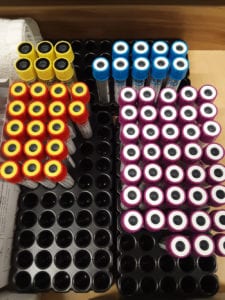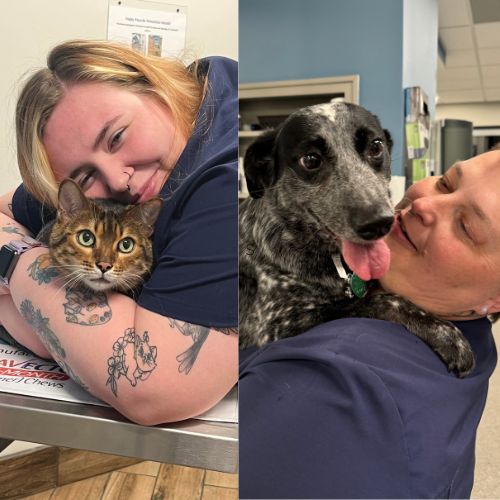Pet’s of all ages benefit from blood work. By using this crucial tool, we know exactly where your pet stands as he or she ages—arming us with more of the best information to ensure your fur baby lives the best and longest life.
Healthy Pets Are Strong Inside and Out
Your vet learns a lot about your pet from the “nose-to-tail” full physical exam: expertly assessing the ears, eyes, teeth, gums, joints, skin, paws, and more, plus listening to the heart and lungs. This is the most important part of any wellness visit.
Blood work helps your vet learn about the inside of your pet, namely the health of vital organs and essential systems. Blood work reveals so much about your pet’s:
- White blood cells – key to the immune system
- Red blood cells – key to oxygen-carrying capacity
- Glucose level – key to diagnosing diabetes
- Cholesterol
- Digestive enzymes
- Internal chemistry
- Liver and kidney function
And much, much more. Blood work offers so much knowledge about so many complex vital things. We’re happy to go into detail if you have questions! Just give us a call at (919) 471-0308.
Bottom line: Regular wellness visits, with physical exams and blood work, ensure your pet lives his or her best, healthiest, happiest—and longest—life.
Preventative Medicine Is the Best Medicine
Prevention is worth a pound of cure! As pet parents, we want to know our fur babies are in their best shape, plus catch any potential problems as early as possible. Normal blood work results mean you can rest easy. And the earlier we can spot and address any issues, the better off your pet will be for life.
For instance, if routine blood work reveals an issue with the kidneys, we can act quickly to put your cat on a special diet to boost kidney function and dramatically slow the progression of kidney disease. If blood work reveals an issue with a thyroid hormone called T4, we’re armed with the best information on how to treat your dog for hypothyroidism.
Blood work is not only what’s best for your pet—it gives you peace of mind and empowers you as a pet parent. As with all essential wellness care, the cost of blood work now saves money, and stress, in the long run.
Establishing a Baseline of Health

We know blood work is crucial if your pet is sick or has a chronic health condition. It can also be critical prior to starting your pet on a new medication, and while your pet is on that medication since we need to know how your pet’s vital organs respond to the treatment.
But did you know? Young pets benefit from blood work, too. Even puppies! Puppy blood work can rule out, or reveal, a variety of congenital diseases.
Healthy pets need blood work once a year so we can expertly monitor and track any changes—so your pet gets the best diet, treatment, and/or medication as soon as possible to keep him or her in great shape. Bottom line: Blood work helps your pet get the best care.
Blood Work Before Surgery
Pets need blood work before any surgical or dental procedure that requires anesthesia. Blood work helps determine that your pet can safely undergo anesthesia, plus helps your vet determine the safest dose of anesthesia.
Blood Work for Senior Pets

Petunia helps us get set for her blood work. We usually only need one or two tubes!
We know blood work is beneficial for pets of all ages. We’ve seen with our own eyes how life-changing diagnosis and treatment based on blood work can be—especially for our senior pets.
As fur babies age, even the most dedicated pet parents might not notice tiny changes, especially as pets are programmed to hide symptoms of discomfort and pain. That’s why senior pets benefit most from physical exams and blood work twice a year.
We don’t want to wait until something is seriously and obviously wrong. Blood work helps us know what’s happening right now.
Good news! Blood work often identifies an underlying health issue that’s easily treatable. Many senior pets actually start acting younger and happier after blood work nails down a particular issue and treatment begins.
If your pet has never had blood work, that’s OK! Now is a great time to start this crucial care.
Blood Work and Beyond
Routine blood work is called a “young wellness panel” or “senior wellness panel.” Blood work is usually back within 24 to 48 hours, whereupon your vet will analyze the results carefully and make sure you’re informed promptly with either an all-clear or recommendations for treatment and care.
Laboratory testing has gotten so good we can even tailor it to exactly what your pet needs. There are myriad panels that include specific tests, such as heart function, that drill down on a particular symptom or suspected problem. Taking factors of age, health, and lifestyle into account, your vet will know exactly what testing panel is best for your pet.
When we say “blood work,” we mean a testing panel for white blood cells, red blood cells, internal chemistries, liver and kidney function, and the like—as the bulleted points above illustrate in general. Other crucial testing could include:
- A heartworm test: Heartworm testing is very important, and does require a few drops of blood. But it is not the same as “blood work.” A heartworm test is a stand-alone test, performed in-house, that reveals results in about 10 minutes.
- Urinalysis: Some pets are prone to urinary issues, such as a build-up of crystals in the urine. Crystals are painful and can even be life-threatening. Urinalysis is often a crucial diagnostic tool, especially for cats. Let us know right away if your pet ever exhibits any signs of urinary issues. Many comprehensive testing panels include a urinalysis.
- An intestinal parasite screen: Parasites are gross! And dangerous to both pets and people. Your pet needs to be screened annually, via a fecal sample, for the presence of parasites, fungus, protozoa, and other nasties.
The Last Word on Blood Work
We promise to use everything we’ve got at our disposal to help keep your pet healthy and happy for a long, long time. Blood work is an essential part of the best care.
Let us know how we can help your pet! We’re here at (919) 471-0308.



